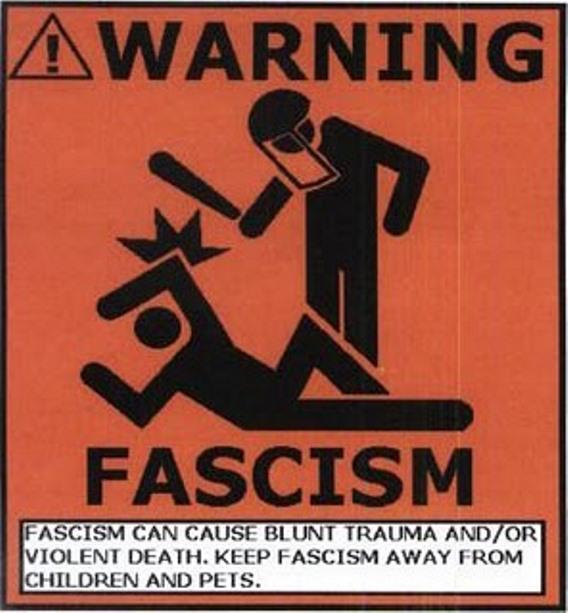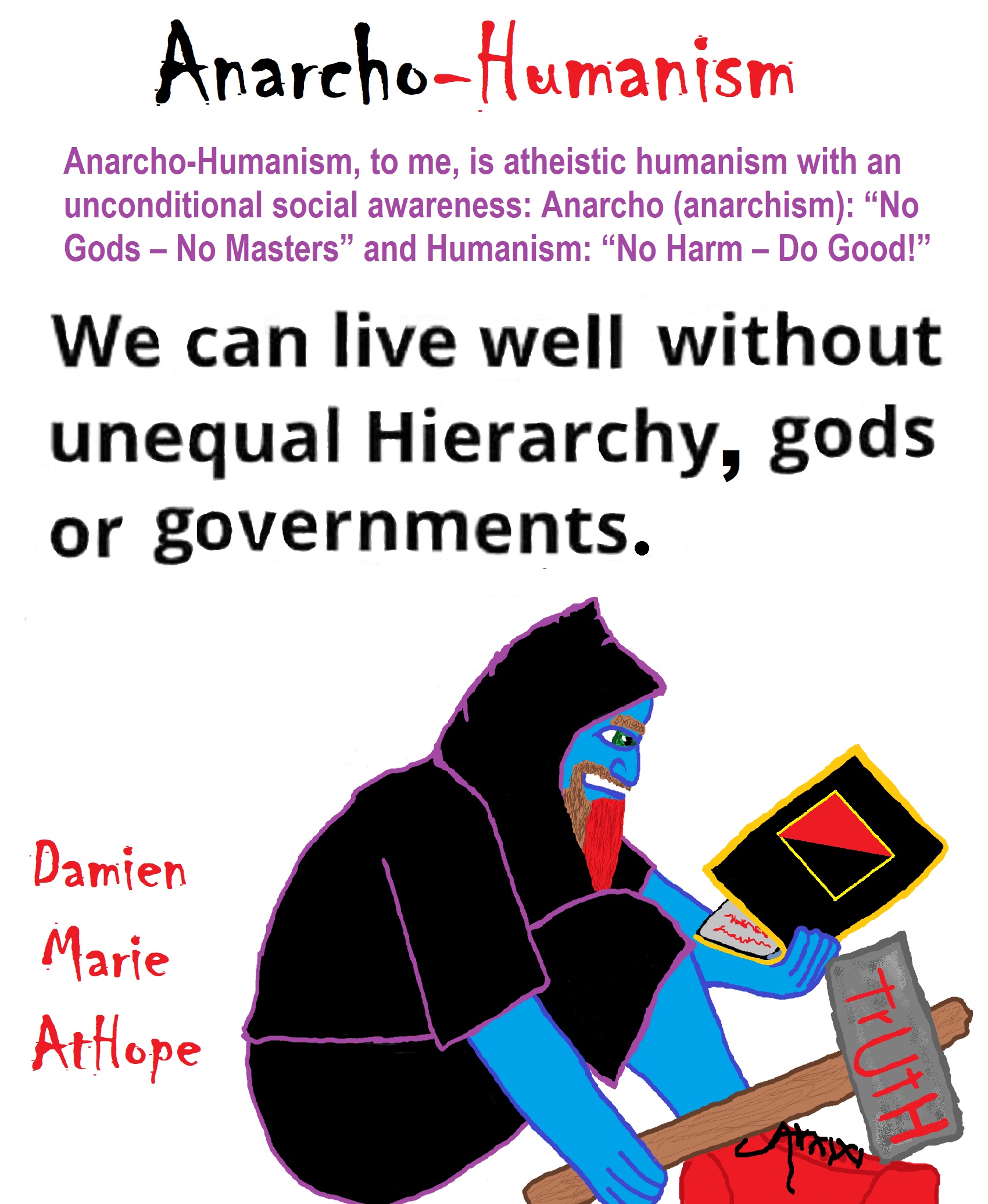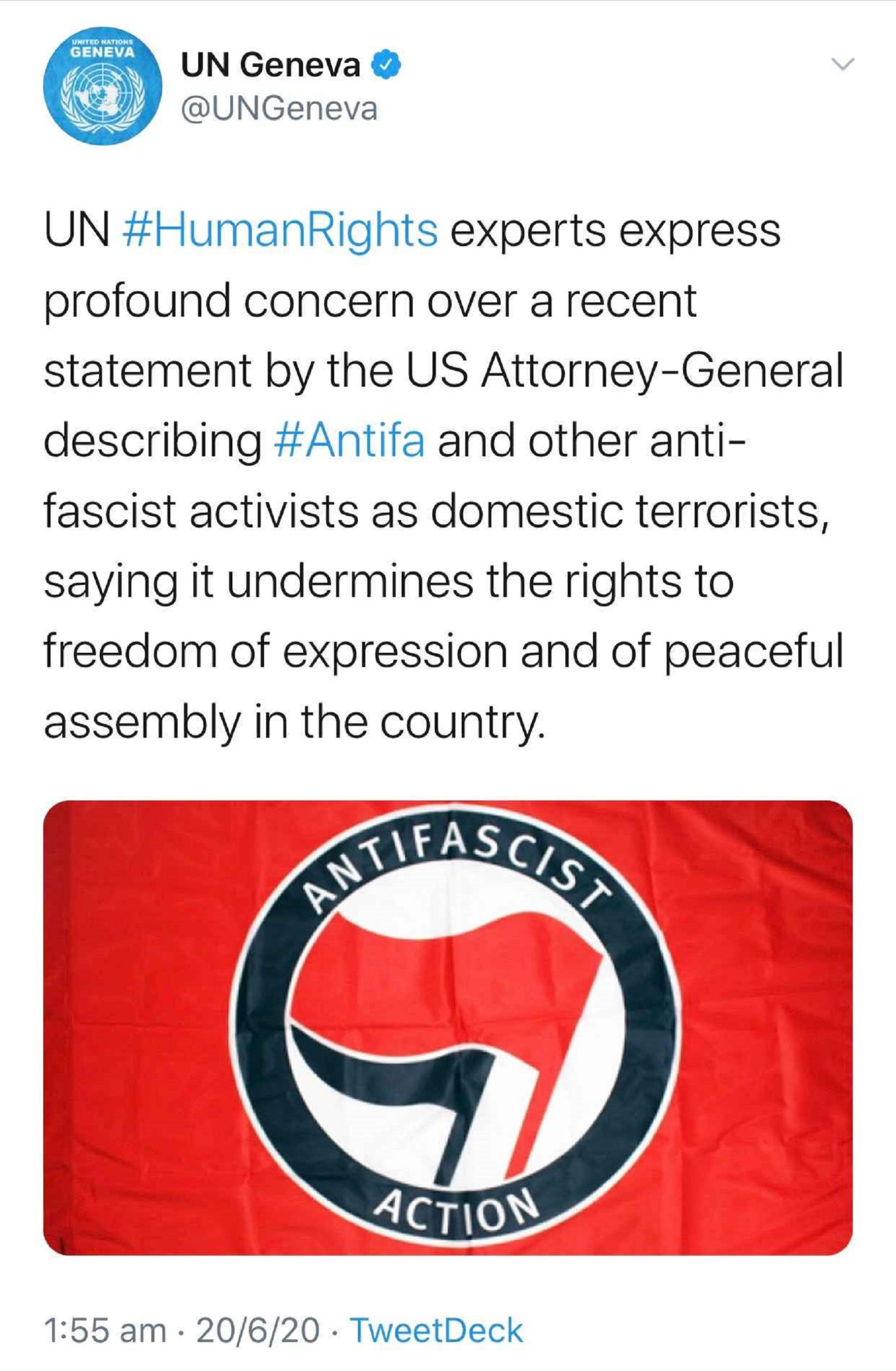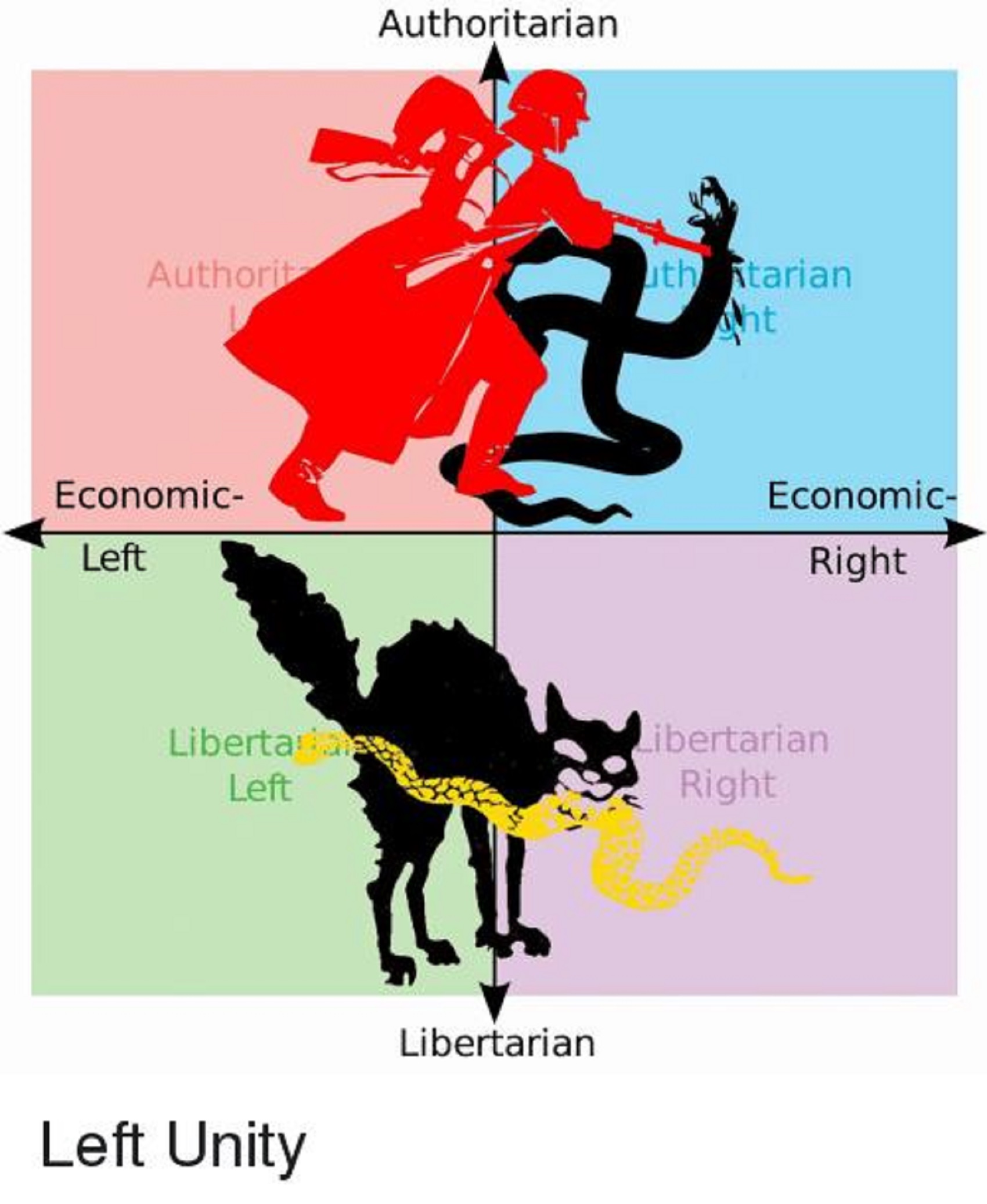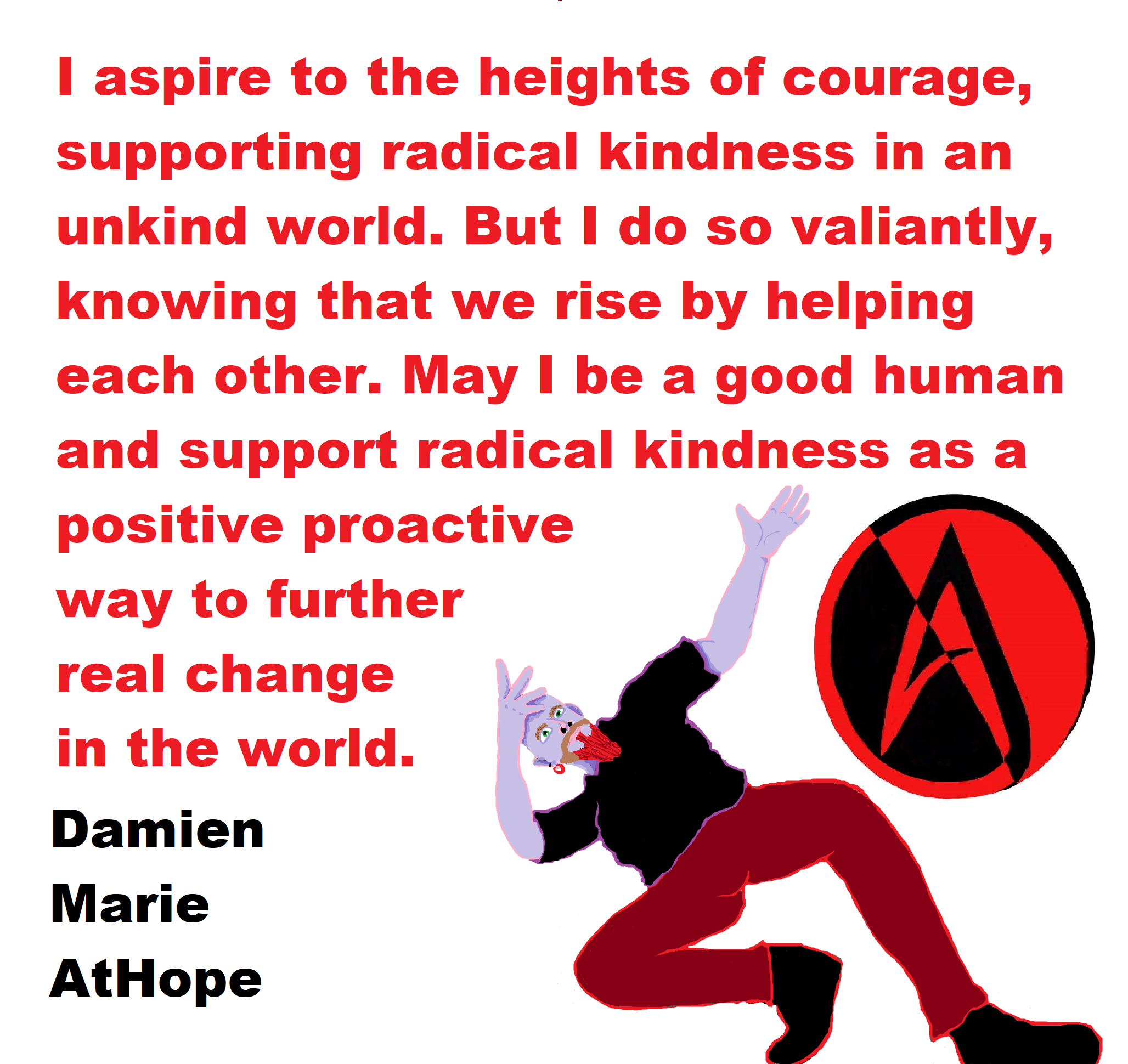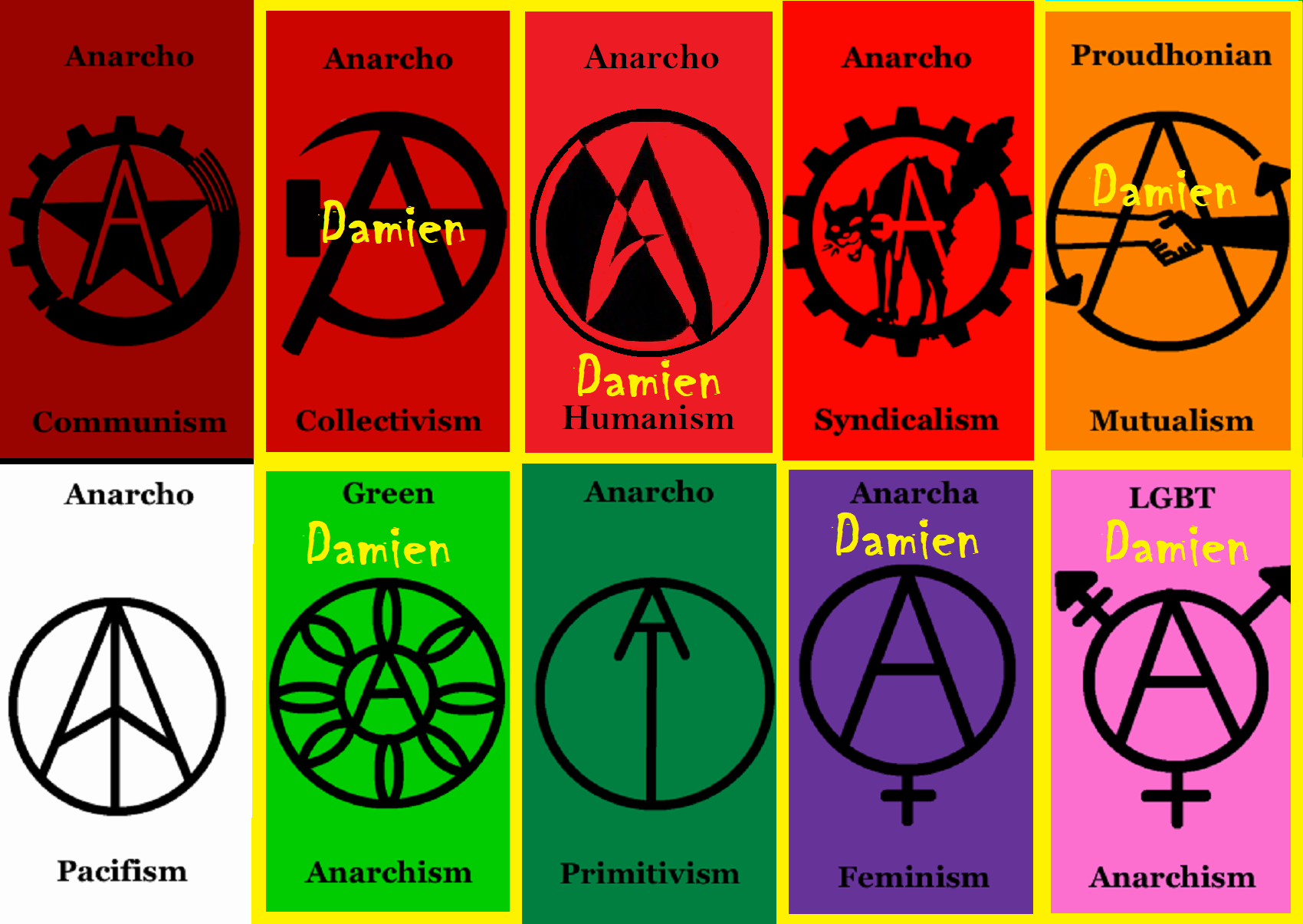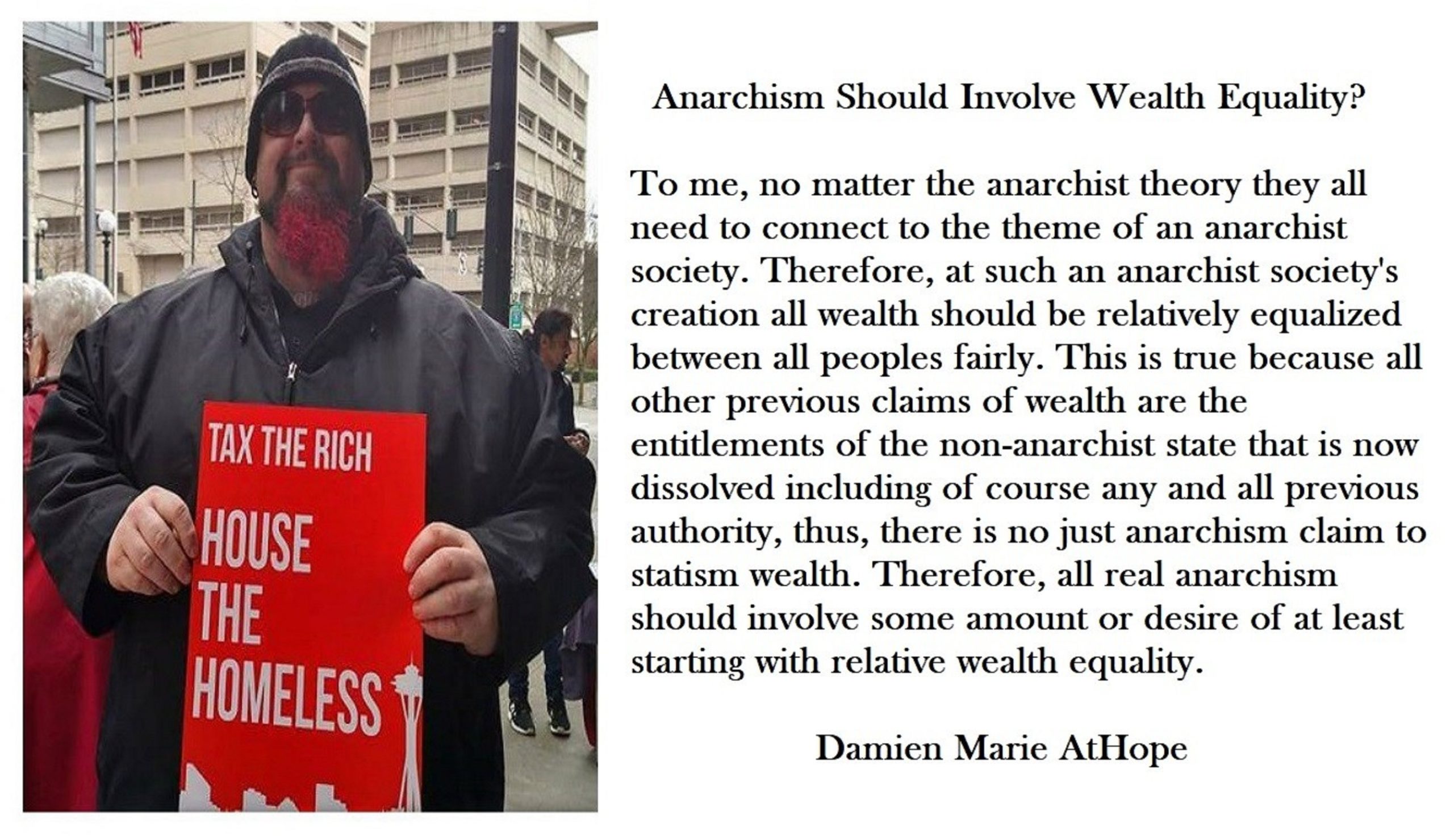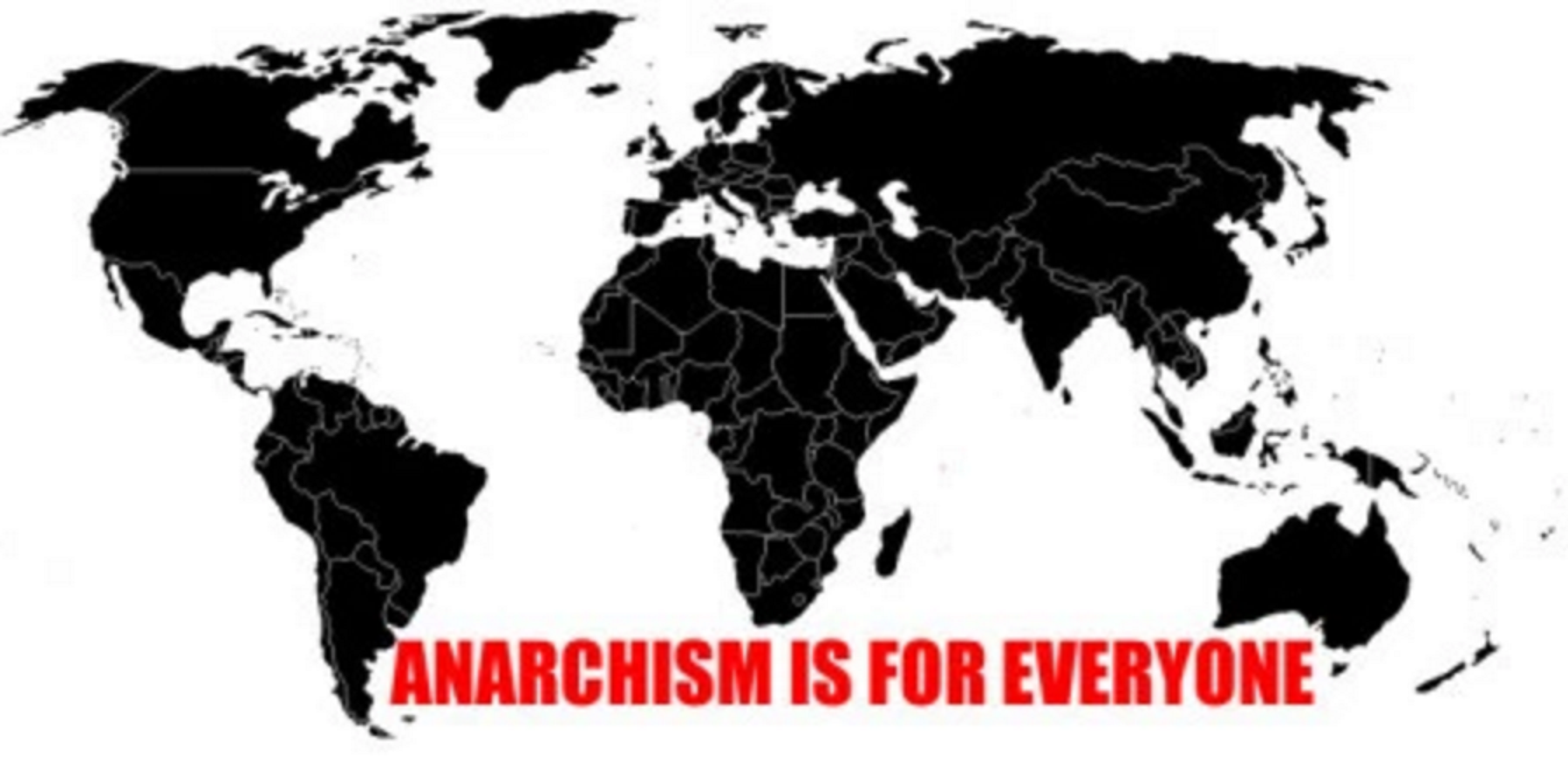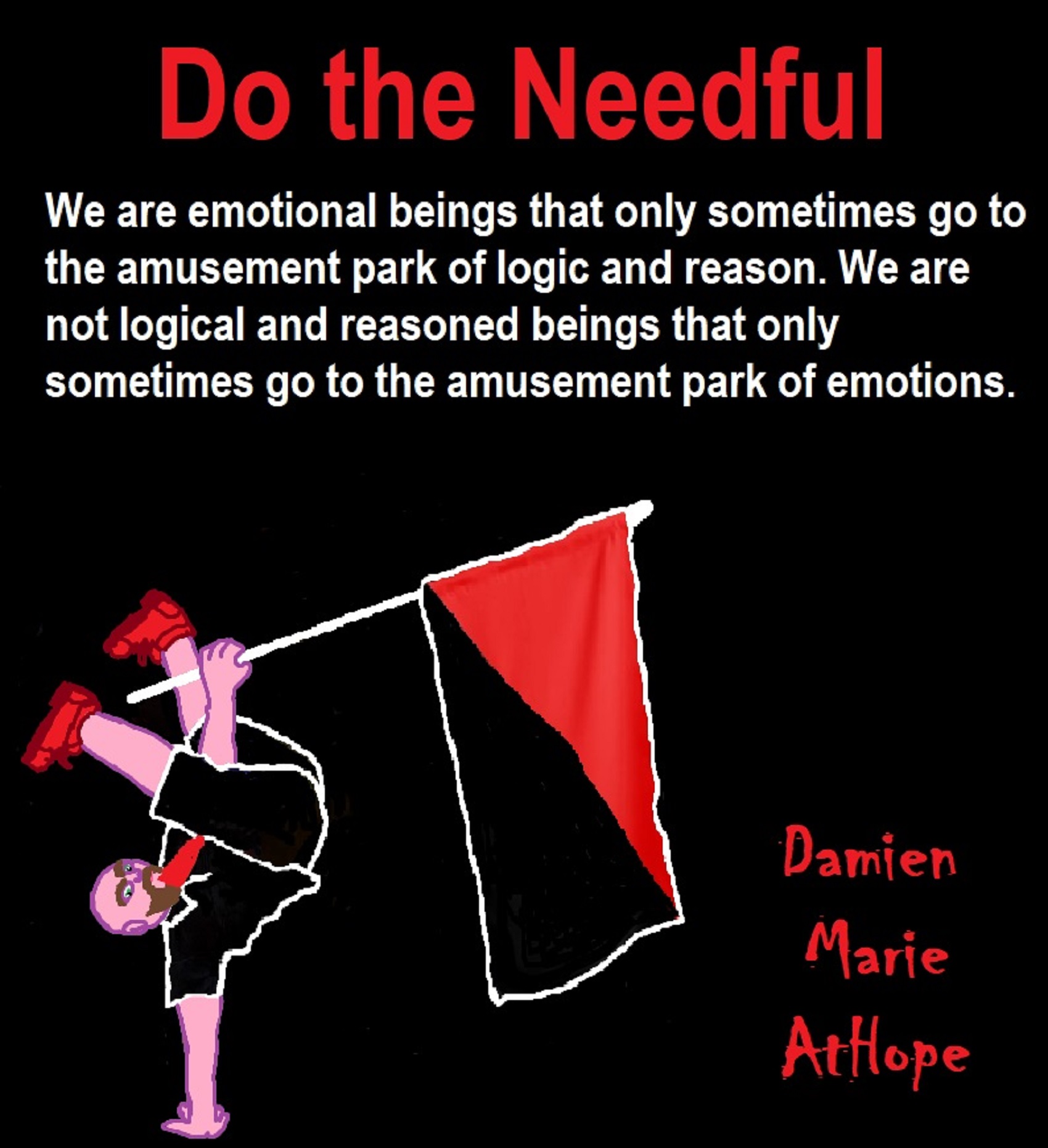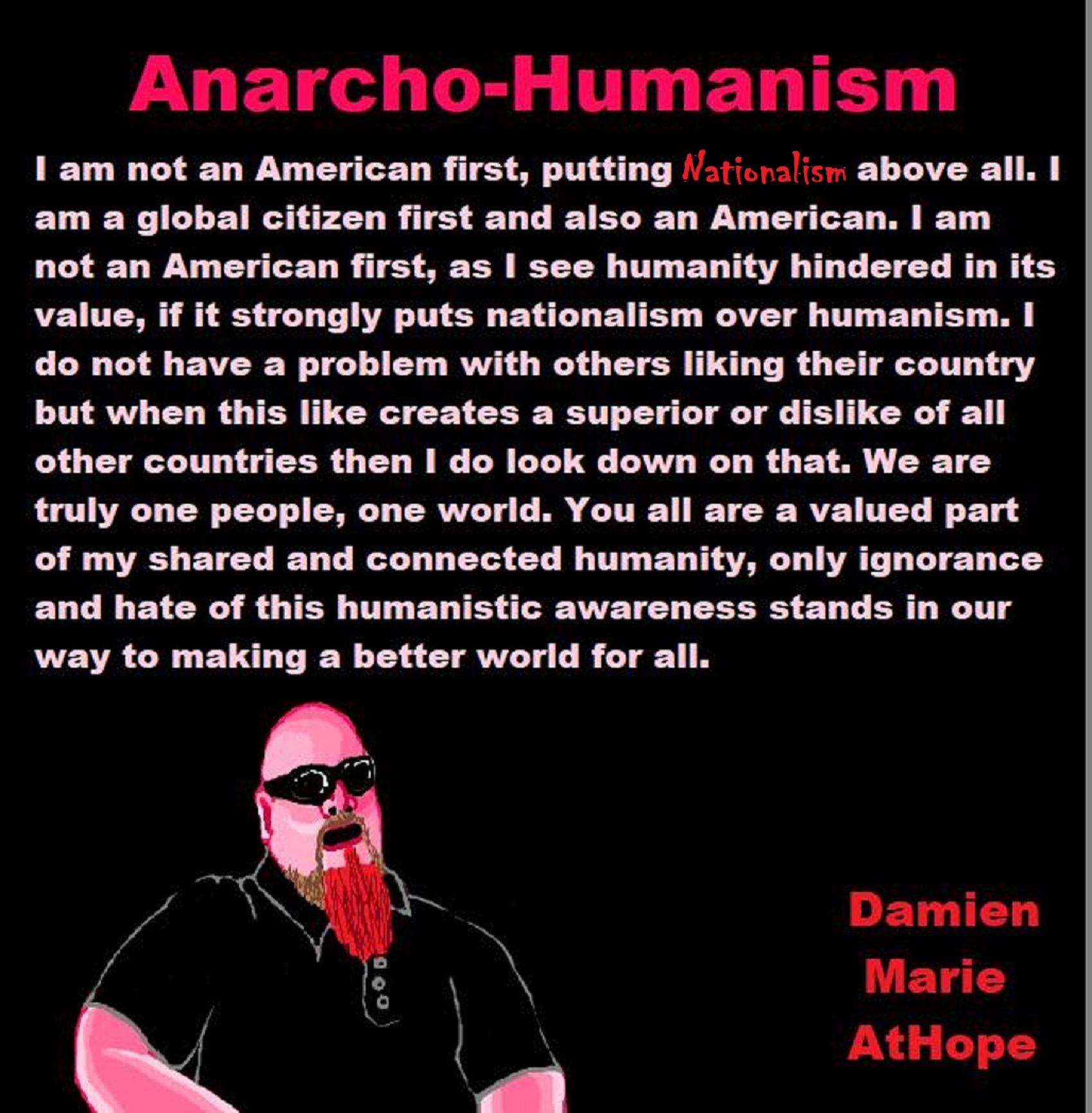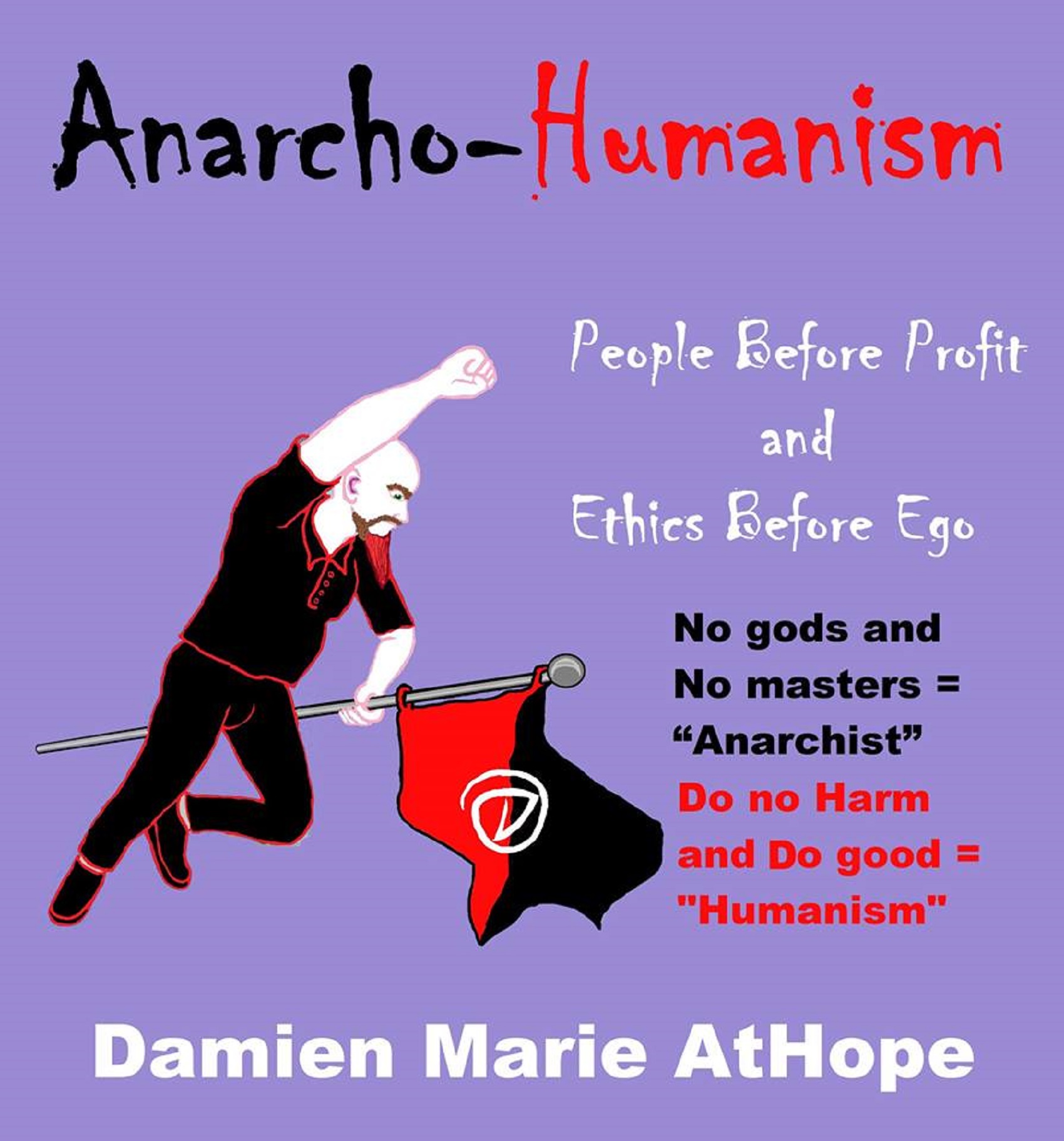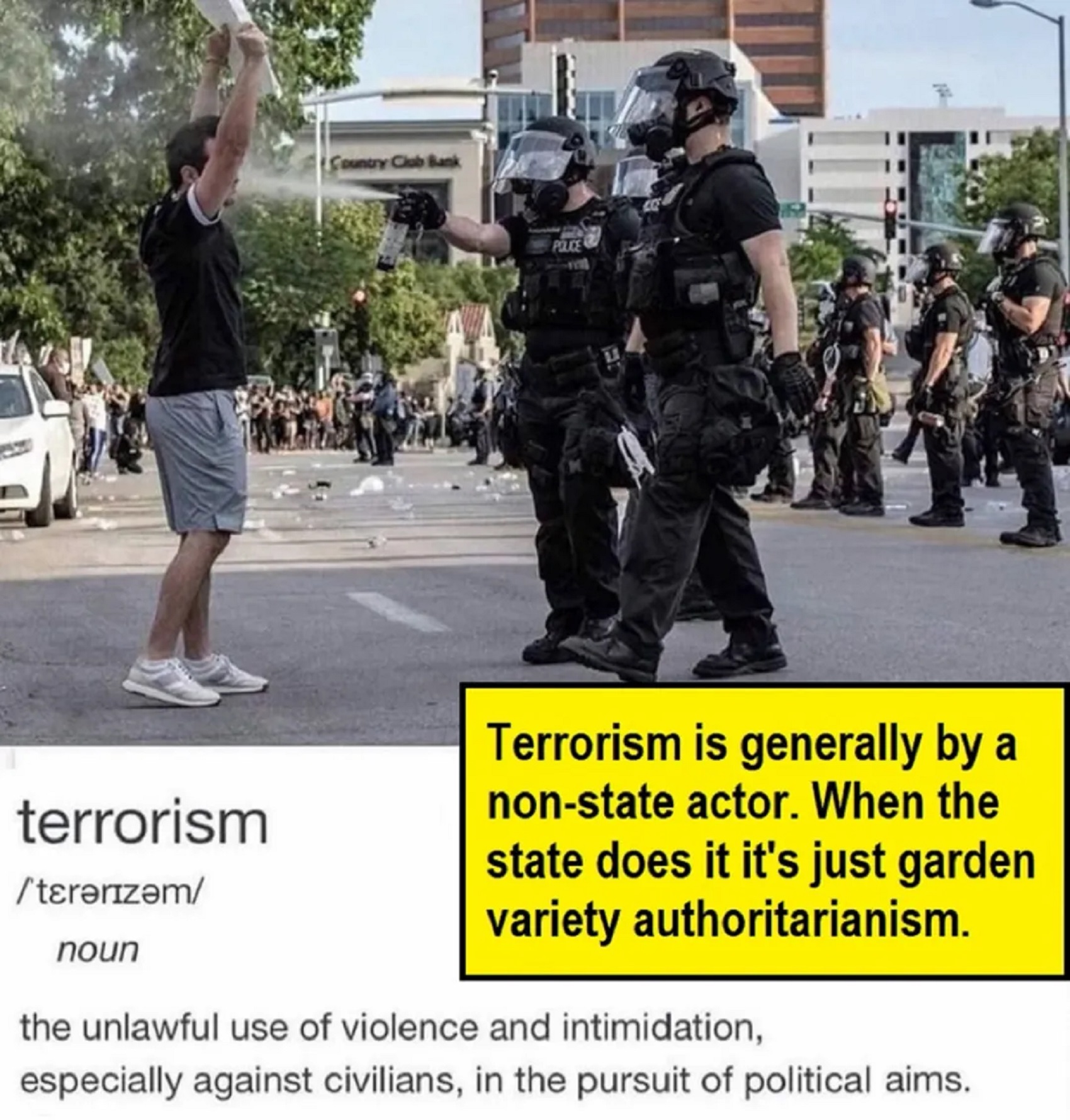
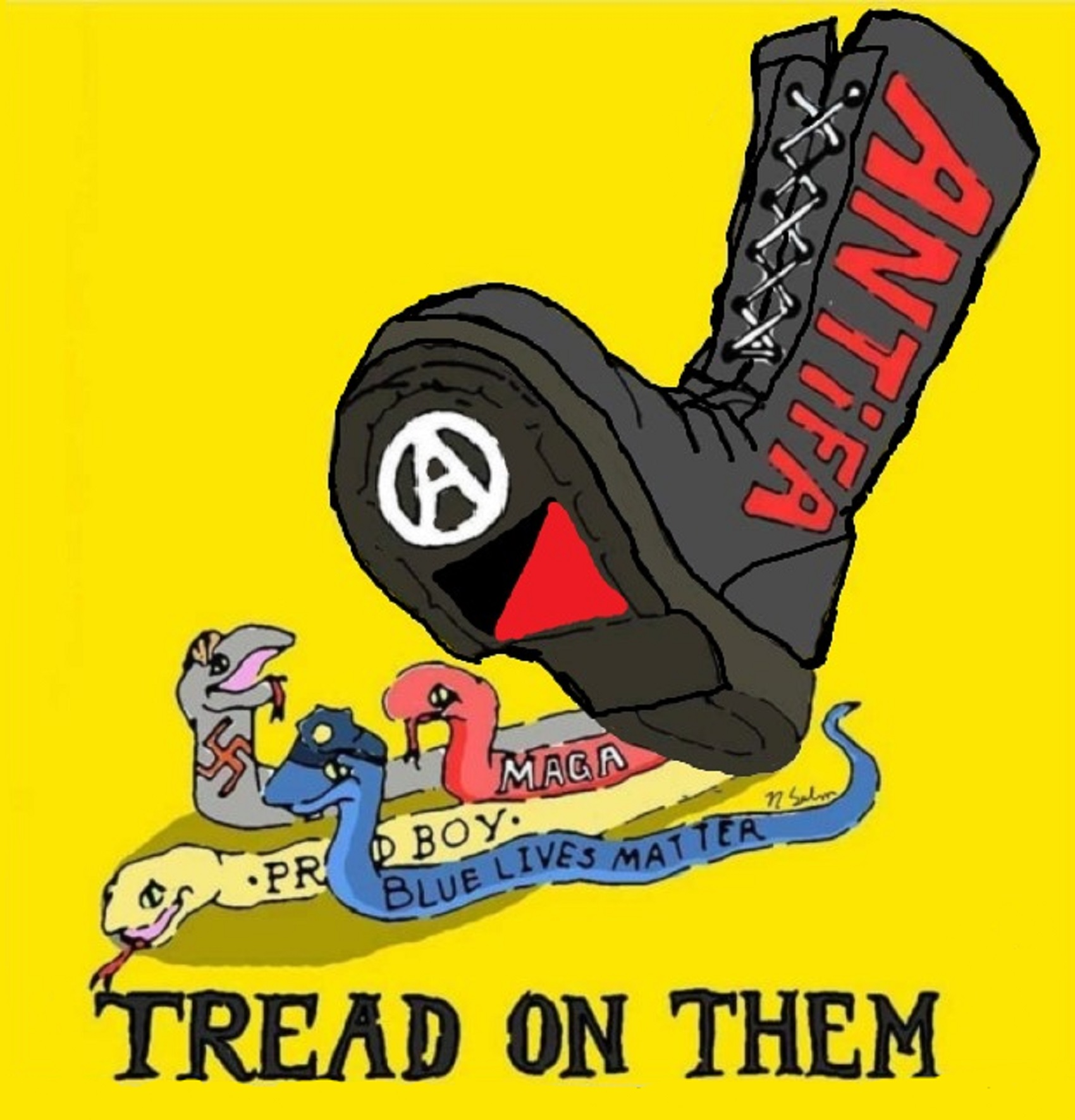
I oppose Fascism but what is Fascism?
Fascism is a form of radical authoritarian nationalism commonly described as “extreme right” originated in Italy during World War I by Italian national syndicalists who combined left-wing and right-wing political views. Fascism considered right-wing because of its social conservatism and authoritarian means of opposing egalitarianism. While fascism includes Nazism, Nazism might be seen as an extreme variant of fascism. The more a person values absolute equality among all people, the further left they will be on the ideological spectrum. The more a person considers inequality to be unavoidable or even desirable, the further to the right they will be.
Fascism is influenced by national syndicalism in opposition to liberalism, Marxism, anarchism and traditional conservatism. National syndicalism developed in France, and then spread to Italy, Spain and Portugal. National syndicalism is an adaptation of syndicalism to suit the social agenda of integral nationalism. Fascism was founded by Italian national syndicalists, who combined elements of left-wing politics with more typically right-wing positions, in opposition to socialism, communism, liberal democracy and, in some cases, traditional right-wing conservatism.
Integral nationalism or Integralism, is an ideology which defends social differentiation and hierarchy with co-operation between social classes, transcending conflict between social and economic groups. French National syndicalism was an adaptation version of revolutionary syndicalism to the monarchist ideology of integral nationalism, as practiced by Action Française, which involves the support of anti-democratic socialism seen as the “pure” and correct form of socialism. Action Française was a French nationalist-monarchist movement led by Charles Maurras (1900–1908).
National syndicalists or Integral nationalism/Integralism especially in Latin America can be associated with fascism in so extent or another, although there exist deep points of disagreement: integralism stresses trade unionism and localism while fascism defends a centralist state; the traditionalist and Catholic foundation of integralist ideas against the often secular and anti-clerical, and modernist philosophical basis of fascism.
National syndicalism in the Iberian Peninsula (Spain and Portugal) is a political theory very different from the fascist idea of corporatism, inspired by Integralism and the Action Française. It was formulated in Spain in a manifesto published in 1931. National syndicalism was intended to win over the anarcho-syndicalist to a corporatist nationalism. Fascism is often placed on the far-right within the traditional left–right spectrum, but some academics call that description inadequate. Fascism was influenced by both left and right, conservative and anti-conservative, national and supranational, rational and anti-rational.
Fascists seek to unify their nation through a totalitarian state that seeks the mass mobilization of the national community, relying on a vanguard party to initiate a revolution to organize the nation on fascist principles. Hostile to liberal democracy, socialism, and communism, fascist movements share certain common features, including the veneration of the state, a devotion to a strong leader, and an emphasis on ultranationalism, ethnocentrism, and militarism. Fascism views political violence, war, and imperialism as a means to achieve national rejuvenation and asserts that “superior” nations and races should attain living space by displacing weak and inferior ones.
Fascist ideology consistently invoked the primacy of the state. Fascist ideology can involve a political philosophy, movement, or regime that exalts nation and often race above the individual and that stands for a centralized autocratic government headed by a dictatorial leader, severe economic and social regimentation, and forcible suppression of opposition. Fascist ideology often strong and charismatic leaders such as Benito Mussolini in Italy and Adolf Hitler in Germany embodied the state and claimed indisputable power. Fascism borrowed theories and terminology from socialism but applied them to what it saw as the more significant conflict between nations and races rather than to class conflict, and focused on ending the divisions between classes within the nation.
Fascism advocates a mixed economy, with the principal goal of achieving autarky to secure national self-sufficiency and independence through protectionist and interventionist economic policies. Fascism opposed socialist and communist ideology but was also critical of some aspects of capitalism, arguing for what is sometimes called a Third Position between capitalism and Marxist socialism. A major element of fascism that has been deemed as clearly far-right is its goal to promote the right of claimed superior people to dominate while purging society of claimed inferior elements.
Italian Fascists described fascism as a right-wing ideology in the political program, “The Doctrine of Fascism” stating: “We are free to believe that this is the century of authority, a century tending to the ‘right,’ a fascist century.” However, Mussolini clarified that fascism’s position on the political spectrum was not a serious issue to fascists and stated whether Fascism, sits on the right, it could also have sat on a mountain of the center. Going on to say, “We don’t give a damn about these empty terminologies and we despise those who are terrorized by these words.” A number of fascist movements try to describe themselves as a “third position” outside the traditional political spectrum. Mussolini used fascistic Militarism and Nationalism on the Italian People.
The key factors used by Benito Mussolini to gain the trust of the Italian people were militarism and nationalism. Nationalism is devotion and patriotism to your country with constant glorification and promotion of the country’s values and culture. This constant promotion of the country’s values led to absolutely unjustifiable decisions that were perceived as setting standards for a country’s people, but actually inhumane acts. Mussolini promoted the cultural and political values of the Italian Fascists by using lots of propaganda across Italy. This large amount of propaganda displayed across the country is important because it made the Italian population become more focused on fascism and military power, which strengthened Mussolini’s power in his dictatorship. Mussolini used fascistic nationalism to promote the growth and need of militarism in Italy along with Italian Strength.
Mussolini used fascistic patriotism from his country to give Italy the idea that if they want to become a force as big as they were during the Roman Empire that they would need to have a strong military and constantly promote Italian values. To promote this ideal, Mussolini ordered children from ages 16-65 to enroll in the “New Empires” Military. This new side of Mussolini showed to the Italian people and the rest of the world that he was serious about making Italy the force it was back in the days of the Roman Empire. This use of militarism to enforce national superiority and strength was important because it made Italy become a large threat to neighboring countries and also threatened the balance of power and created a potential for war. These nationalistic, militaristic, and fascist values enforced and promoted by the Italians where what eventually led to Italy joining the axis powers and going to war against the allied powers.
Fascism has been criticized for being ideologically dishonest. Major examples of ideological dishonesty have been identified in Italian Fascism’s changing support, rejection back again relationship with German Nazism. Fascist movements emphasized a belligerent, virulent form of nationalism (chauvinism) and a fear of foreign people (xenophobia), which they frequently linked to an exaggerated ethnocentrism. The typical fascist state also embraced militarism, a belief in the rigors and virtues of military life as an individual and national ideal, meaning much of public life is organized along military lines and an emphasis is put on uniforms, parades, and monumental architecture.
Following the Second World War, few parties openly describe themselves as fascist and the term is more usually used pejoratively by political opponents. Moreover, the term fascist has been used as a pejorative word, often referring to widely varying movements across the political spectrum but to do so is not always warranted and if it applies to everything like ‘oppressor’ as a synonym for ‘Fascist’ without justification the word ‘Fascism’ becomes almost meaningless as a traditional political ideology but if its referring to national authoritarian/totalitarian militarism then it is likely warranted.
Nationalism is the main foundation of fascism. Fascist movements typically espouse a racist conception. Although, fascists have not always held a unified set of racial views, most fascists promoted imperialism, although there have been several fascist movements that were uninterested in the pursuit of new imperial ambitions. Fascism also promotes the establishment of a totalitarian state. The Doctrine of Fascism states, “The Fascist conception of the State is all-embracing; outside of it no human or spiritual values can exist, much less have value.
Fascism is totalitarian, and the Fascist State—a synthesis and a unit inclusive of all values—interprets, develops, and potentiates the whole life of a people.” Fascist states pursued policies of social indoctrination through propaganda in education and the media and regulation of the production of educational and media materials. Education was designed to glorify the fascist movement and inform students of its historical and political importance to the nation. It attempted to purge ideas that were not consistent with the beliefs of the fascist movement and to teach students to be obedient to the state. One of the most common and strongest criticisms of fascism is that it is a tyranny in practice. Fascism is commonly regarded as deliberately and entirely non-democratic and anti-democratic.
Fascism opposes liberal democracy rejecting any concept of universal egalitarianism. It rejects multi-party systems, and supports a single party state. However, fascists have claimed Fascism supports a variant of democracy stating: “Fascism is a method, not an end; an autocracy on the road to democracy, trying to describe fascism as an authoritarian democracy. “ Fascist economics supported a state-controlled economy that accepted a mix of private and public ownership over the means of production. Economic planning was applied to both the public and private sector, and the prosperity of private enterprise depended on its acceptance of synchronizing itself with the economic goals of the state. Fascist economic ideology supported the profit motive, but emphasized that industries must uphold the national interest as superior to private profit.
While fascism accepted the importance of material wealth and power, it condemned materialism, which it identified as being present in both communism and capitalism, and criticized materialism for lacking acknowledgement of the role of the spirit. Fascism denounced Marxism for its advocacy of materialist internationalist class identity, which fascists regarded as an attack upon the emotional and spiritual bonds of the nation and a threat to the achievement of genuine national solidarity.
Contrary to the popular use of the term, Communist states have sometimes been referred to as “fascist,” typically as an insult. Marxist interpretations of the term have, for example, been applied in relation to Cuba under Fidel Castro and Vietnam under Ho Chi Minh. Herbert Matthews, of the New York Times asked “Should we now place Stalinist Russia in the same category as Hitlerite Germany? Should we say that she is Fascist?” J. Edgar Hoover wrote extensively of “Red Fascism.” Chinese Marxists used the term to denounce the Soviet Union during the Sino-Soviet Split, and likewise, the Soviets used the term to identify Chinese Marxists and social democracy (coining a new term of social fascism).
I oppose Fascism, including all its religious persuasions
Religion and it’s god myths are like a spiritually transmitted disease of the mind. This infection even once cured holds mental disruption which can linger on for a lifetime.
Comment from a fan:
Damien, you were a victim of what you call Christofascism (christian and fascism) as well as religiofascism (religion and fascism). And now you are a warrior for the victims of religious oppression. Imagine what it would be like if we didn’t have people like you out there. (Religion run amok, untethered). Thank you, Damien Marie AtHope.
Political Philosopher Norlyn Dimmitt’s Interview: Compassionate Citizens Foundation
Interview with Anarchist and Firebrand Atheist Courtney Connatser
My political page on Facebook is: Axiological Leftist
Whats wrong with rightists? Well, I am beginning to believe that rightists may be more concerned with perceived financial atrocities committed against the rich than the real social atrocities committed against everyone else.
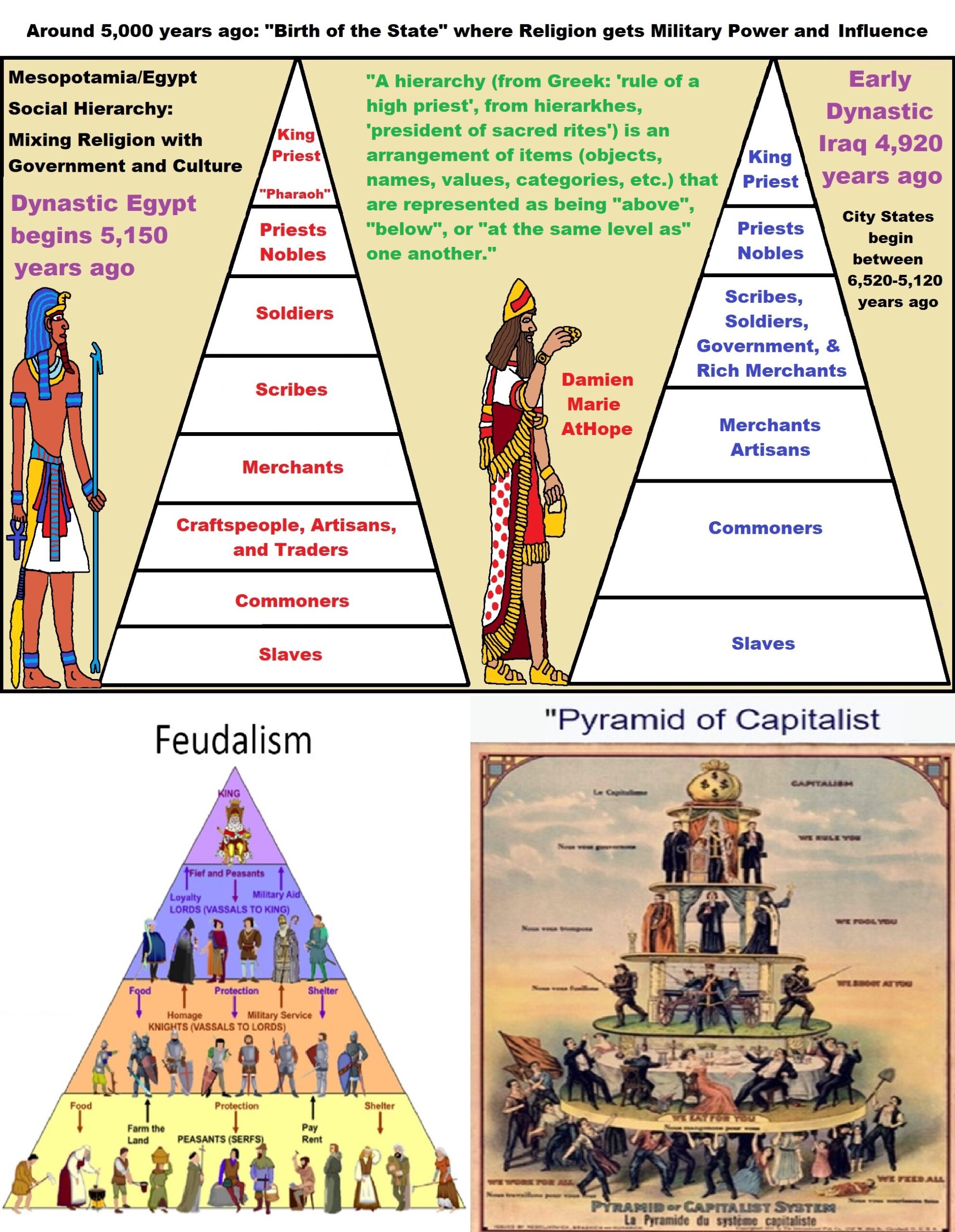
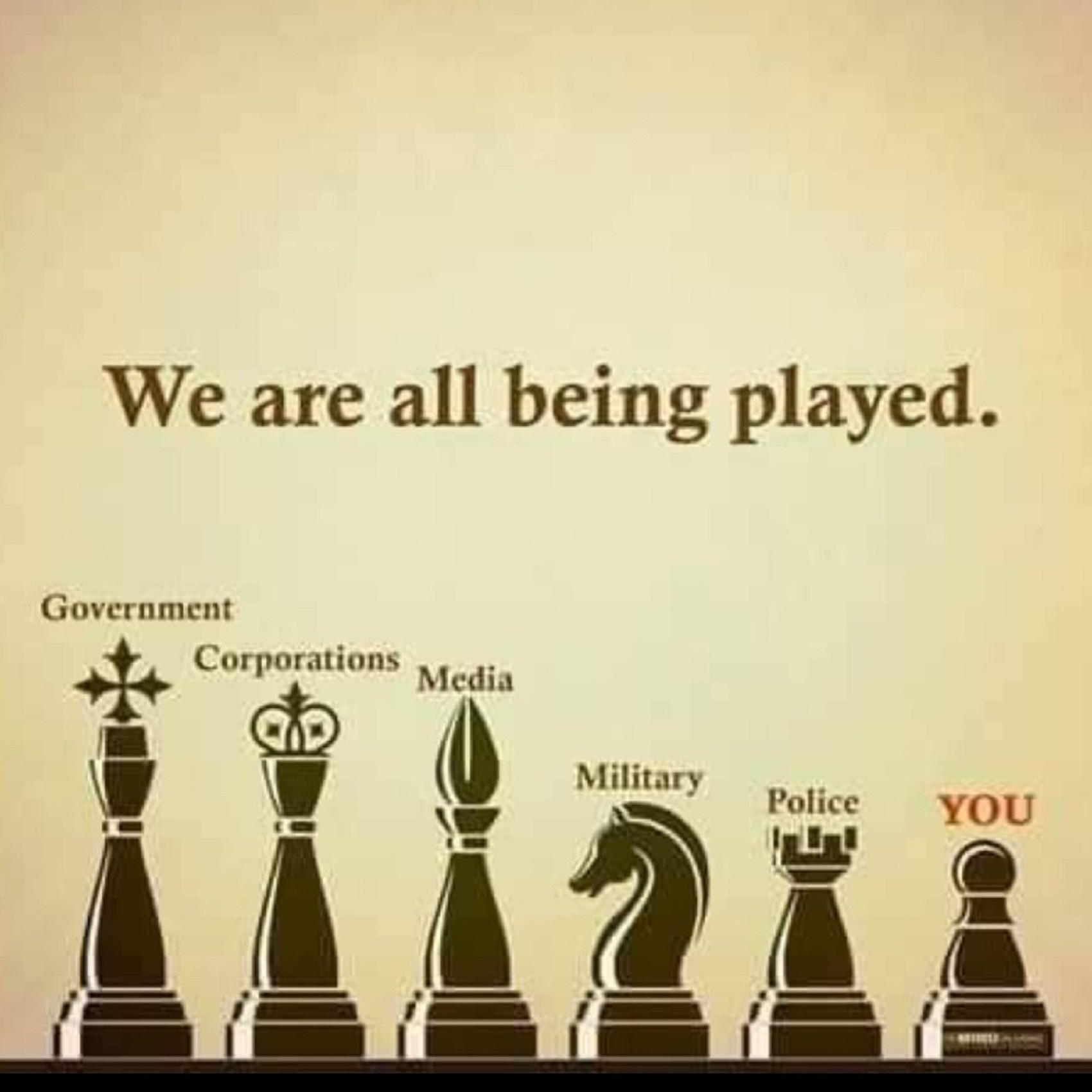
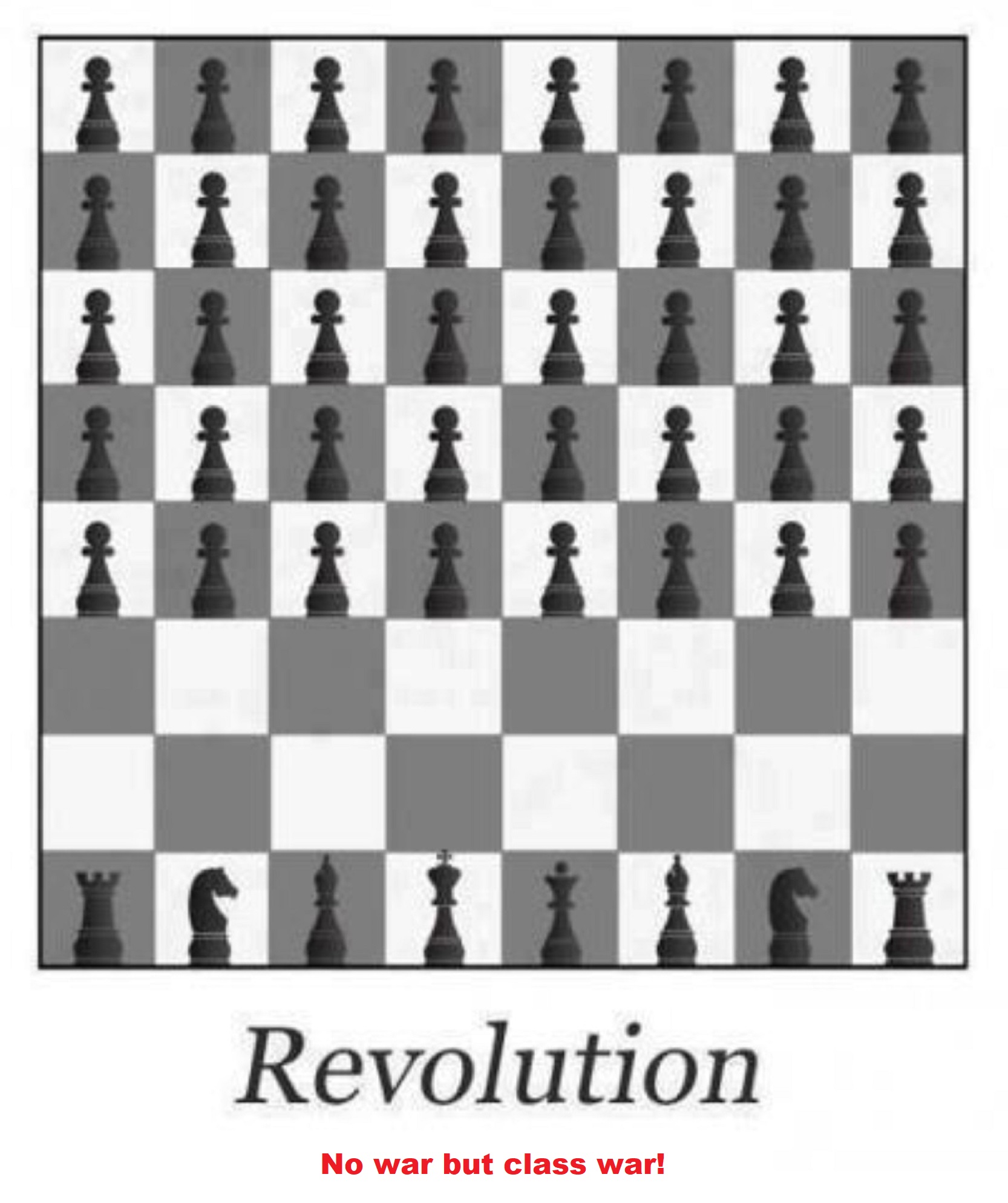
Power Authority Oppression
Limiting the power to a point in authority, maximize the potential for oppression. This is referring to the need for greater inclusion of many instead of the exclusion driven only by the few. Moreover, how this greater inclusion can be adopted is non hierarchical political structure and more direct democracy. Such as a “Heterarchy” which is a system of organization where the elements of the organization are unranked (non-hierarchical) or where they possess the potential to be ranked a number of different ways. Definitions of the term vary among the disciplines: in social and information sciences, heterarchies are networks of elements in which each element shares the same “horizontal” position of power and authority, each playing a theoretically equal role.
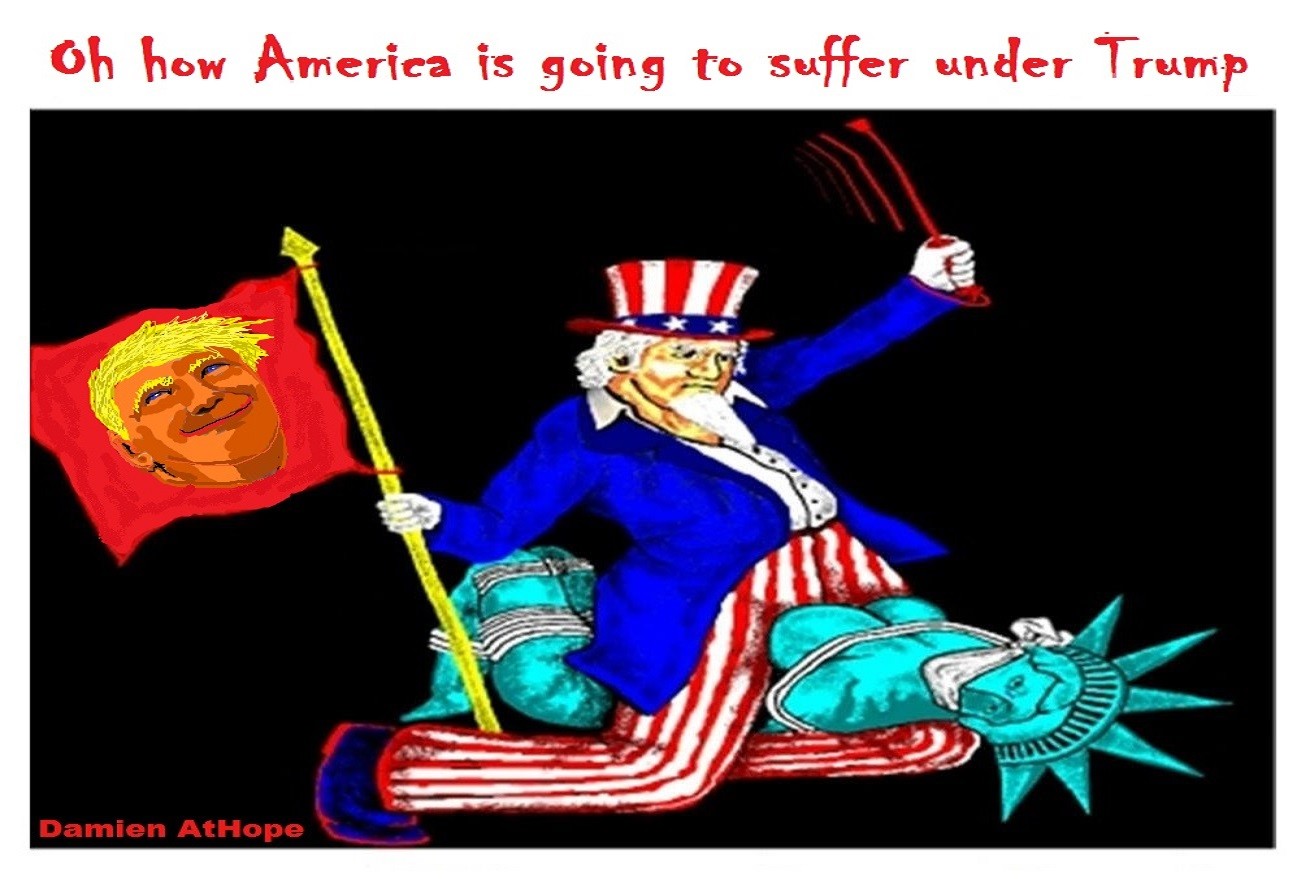
My Reaction to Trump’s Election
I have been ashamed of many things in my life but this is the first time I have been deeply ashamed to be an American, after Mericans voted Trump. America you have broken my heart. How sadistically confident is the mind so assured that the ones at risk for bigotry, discrimination, oppression, or harm are never them, only their victims? Merican to me is generally, a right-winger who is a larger-than-life patriot, likely prone to strong nationalism, xenophobia, or some set of far-right ideologies, whose core belief(s) may be one or all of the following, “American Identity”, “Working Class Identity”, or “White Identity” are under attack by leftwing multicultural forces using “political correctness” and “social justice” to undermine what they see as right. When boastful lies are championed as if they are worthy truths, there has been an attack on the credibility of honesty itself. We can be made into many things in fear and hate, then we would ever consider in hope and love. I have felt shame about things America had done but not for what we are.
Addressing Destructive Cults?
Here are some of my similar blogs on my politics:
My Atheistic (socialist-anarchist) Humanism?
What Inspires My Anarcho-Humanism?
I am an Anarchist and Strive to Fight Injustice
My Kindness is more Cognitive Empathy, not as much Emotional Empathy
My life; the good, the bad, and the ugly on the road to the Mental Freedom of Atheism
I am a “Real Anarchist” not an “Anarcho-Capitalist”
Liberal, Progressive, and Leftist
A Challenge to My Democratic Political Thinking
Liberal, Progressive, and Leftist
Black women of Courage: Elizabeth Jennings, Claudette Colvin, Rosa Parks, and Coretta Scott King.
Pragmatic Ethical/Axiology Driven Assumptions, Overcome the Weight of Solipsism Doubt
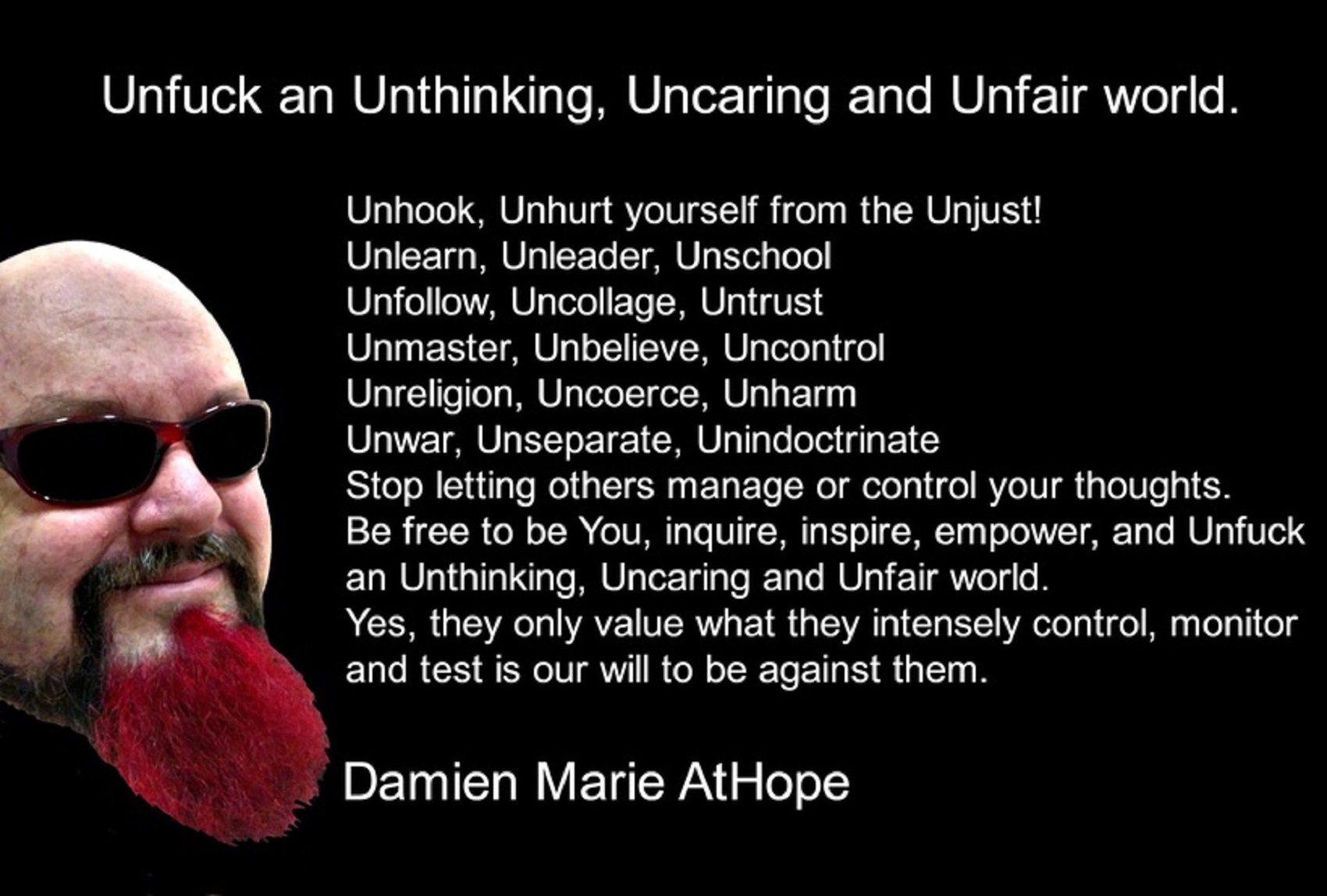
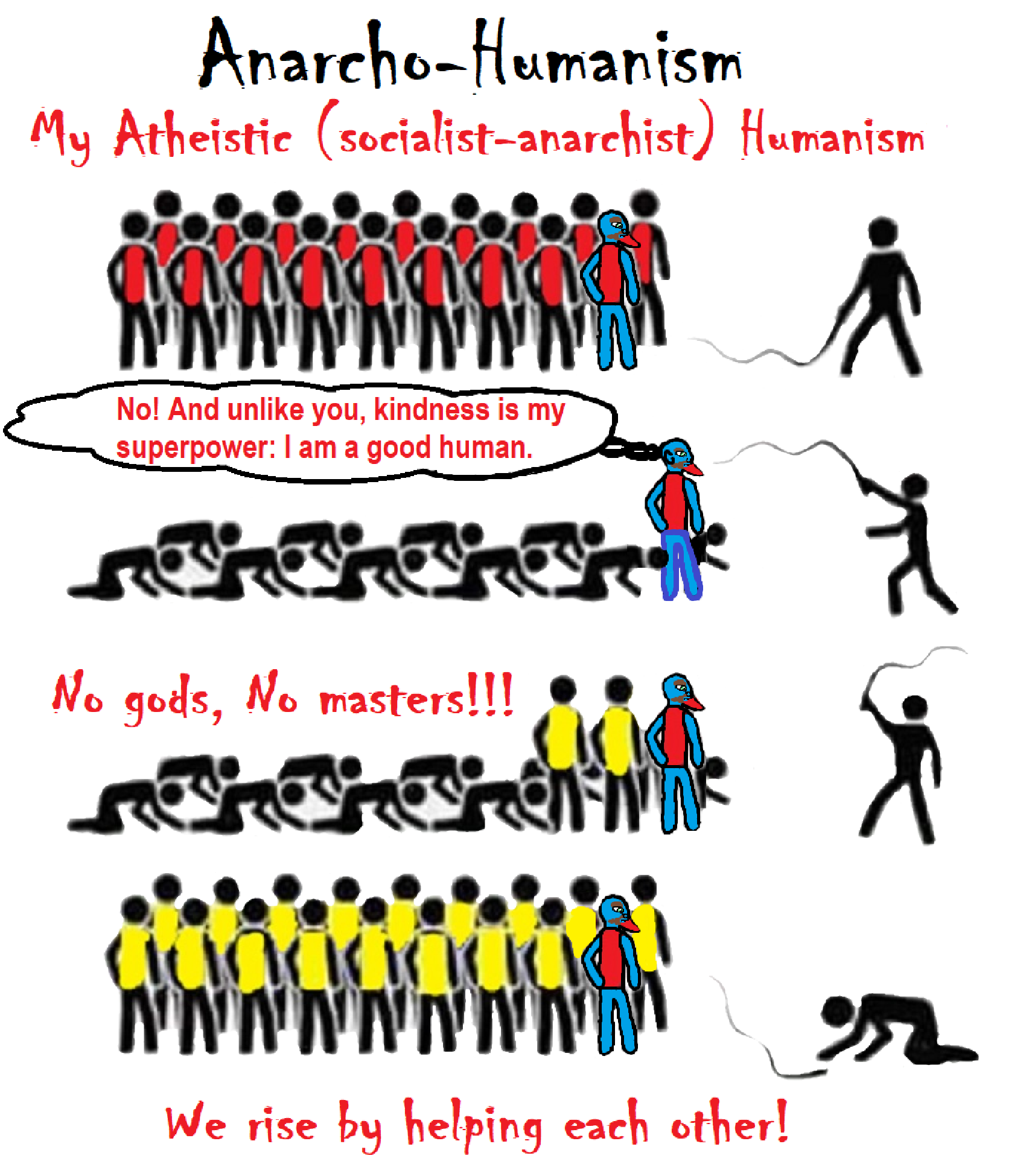
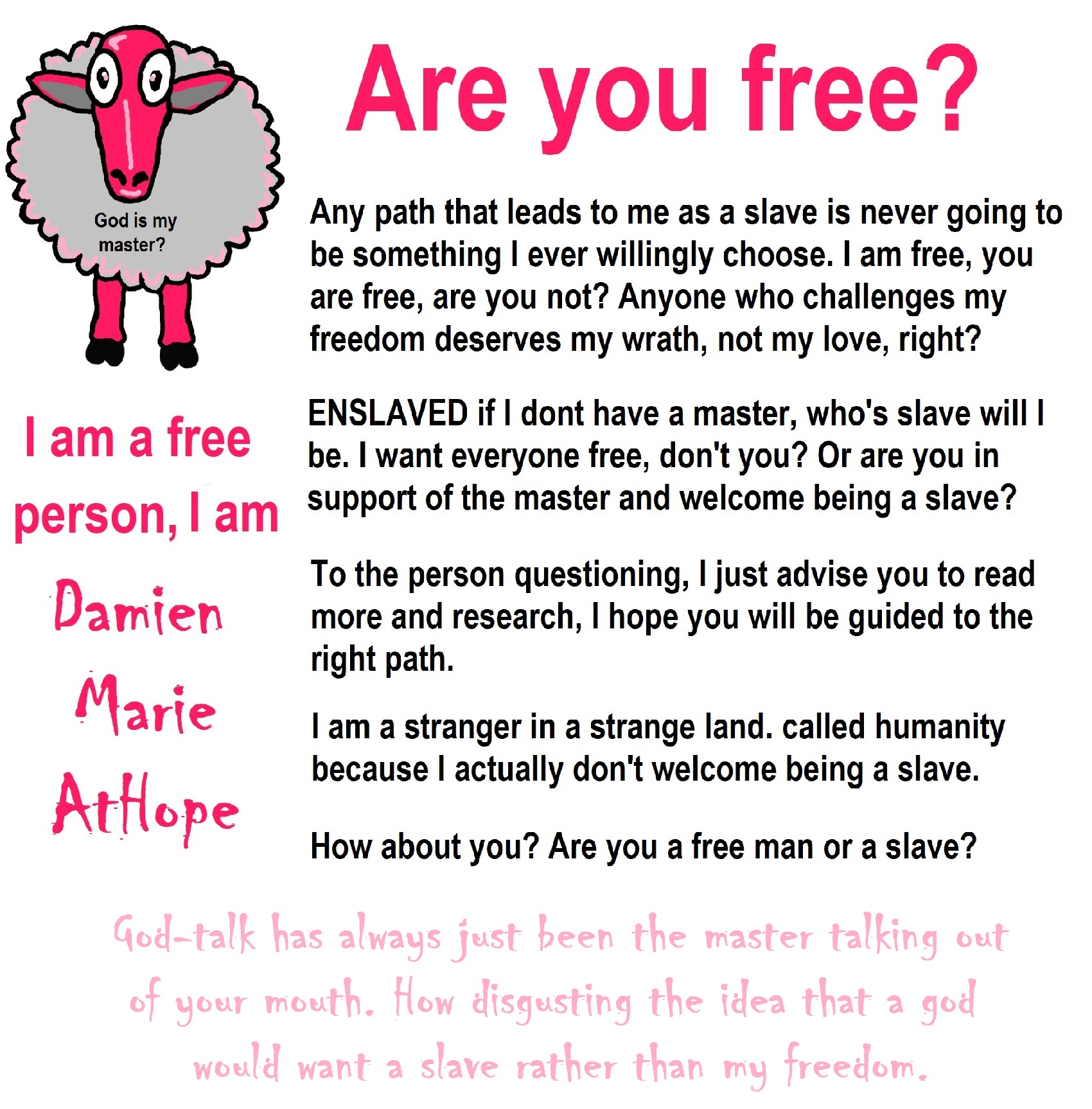
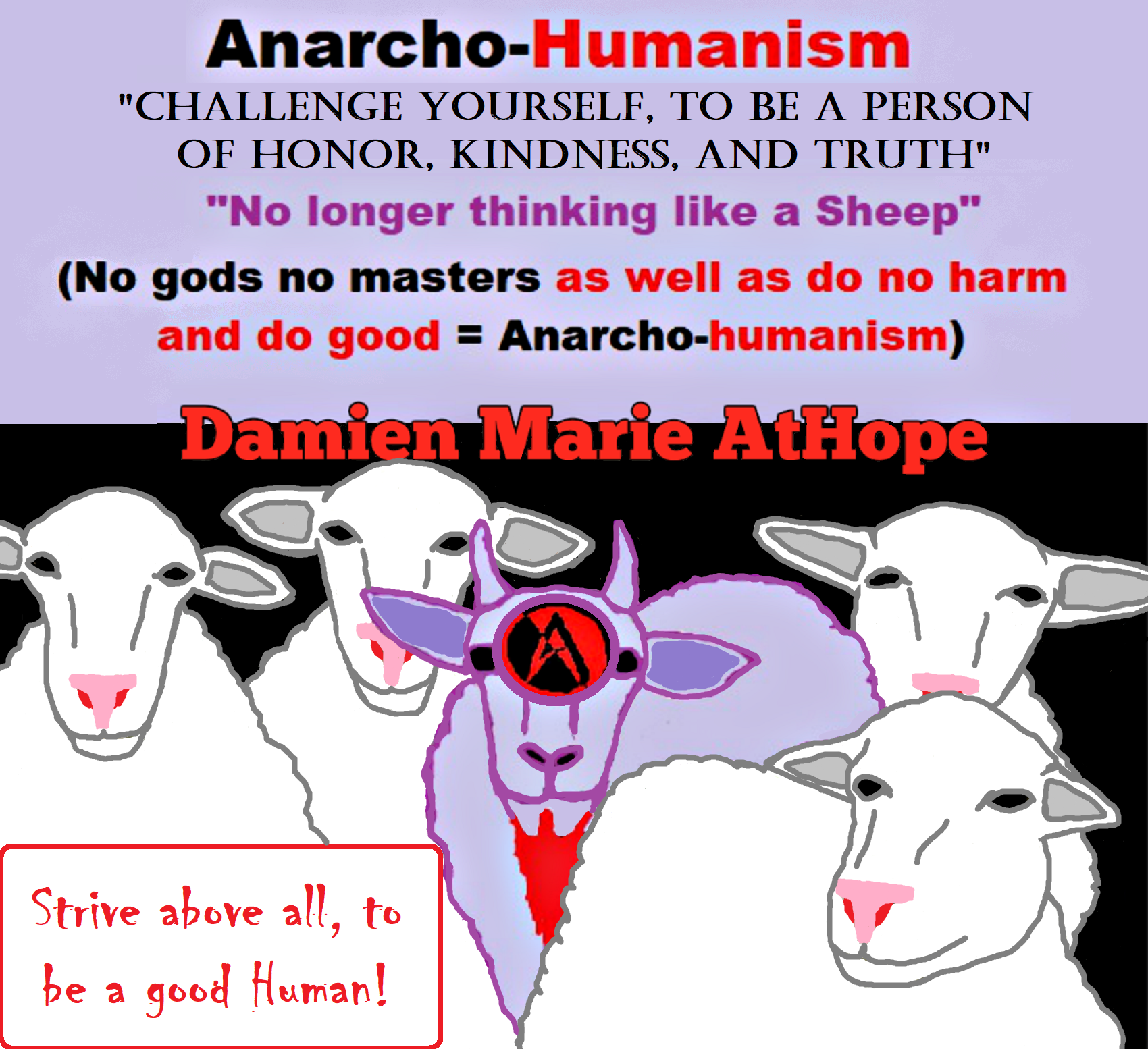
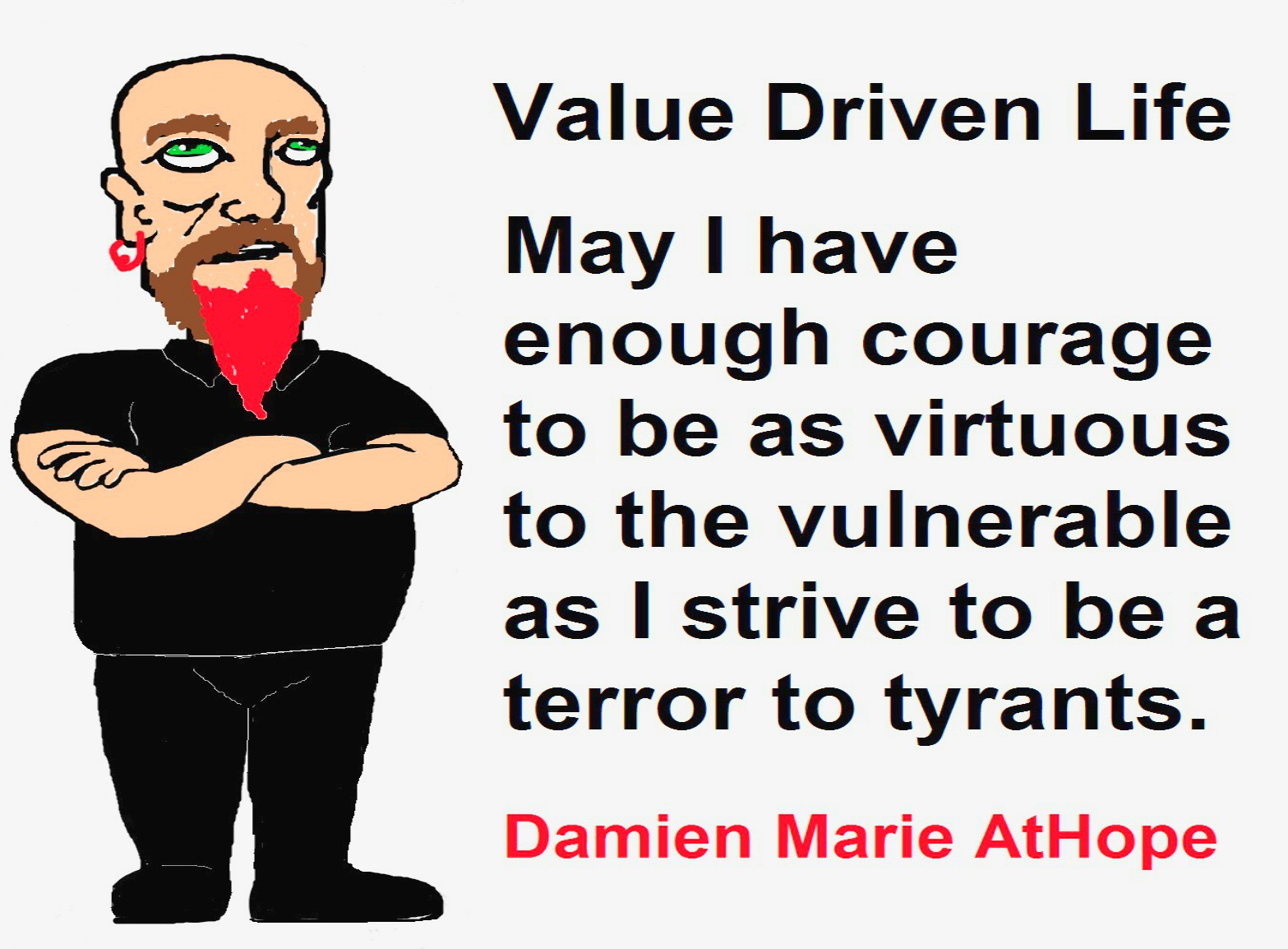

“Theists, there has to be a god, as something can not come from nothing.”
Well, thus something (unknown) happened and then there was something. This does not tell us what the something that may have been involved with something coming from nothing. A supposed first cause, thus something (unknown) happened and then there was something is not an open invitation to claim it as known, neither is it justified to call or label such an unknown as anything, especially an unsubstantiated magical thinking belief born of mythology and religious storytelling.


While hallucinogens are associated with shamanism, it is alcohol that is associated with paganism.
The Atheist-Humanist-Leftist Revolutionaries Shows in the prehistory series:
Show two: Pre-animism 300,000 years old and animism 100,000 years old: related to “Anarchism and Socialism”
Show tree: Totemism 50,000 years old: related to “Anarchism and Socialism”
Show four: Shamanism 30,000 years old: related to “Anarchism and Socialism”
Show five: Paganism 12,000 years old: related to “Anarchism and Socialism”
Show six: Emergence of hierarchy, sexism, slavery, and the new male god dominance: Paganism 7,000-5,000 years old: related to “Anarchism and Socialism” (Capitalism) (World War 0) Elite and their slaves!
Prehistory: related to “Anarchism and Socialism” the division of labor, power, rights, and recourses: VIDEO
Pre-animism 300,000 years old and animism 100,000 years old: related to “Anarchism and Socialism”: VIDEO
Totemism 50,000 years old: related to “Anarchism and Socialism”: VIDEO
Shamanism 30,000 years old: related to “Anarchism and Socialism”: VIDEO
Paganism 12,000 years old: related to “Anarchism and Socialism” (Pre-Capitalism): VIDEO
Paganism 7,000-5,000 years old: related to “Anarchism and Socialism” (Capitalism) (World War 0) Elite and their slaves: VIEDO
Paganism 5,000 years old: progressed organized religion and the state: related to “Anarchism and Socialism” (Kings and the Rise of the State): VIEDO
Paganism 4,000 years old: related to “Anarchism and Socialism” (First Moralistic gods, then the Origin time of Monotheism): VIEDO
I do not hate simply because I challenge and expose myths or lies any more than others being thought of as loving simply because of the protection and hiding from challenge their favored myths or lies.
The truth is best championed in the sunlight of challenge.
An archaeologist once said to me “Damien religion and culture are very different”
My response, So are you saying that was always that way, such as would you say Native Americans’ cultures are separate from their religions? And do you think it always was the way you believe?
I had said that religion was a cultural product. That is still how I see it and there are other archaeologists that think close to me as well. Gods too are the myths of cultures that did not understand science or the world around them, seeing magic/supernatural everywhere.
I personally think there is a goddess and not enough evidence to support a male god at Çatalhöyük but if there was both a male and female god and goddess then I know the kind of gods they were like Proto-Indo-European mythology.
This series idea was addressed in, Anarchist Teaching as Free Public Education or Free Education in the Public: VIDEO
Our 12 video series: Organized Oppression: Mesopotamian State Force and the Politics of power (9,000-4,000 years ago), is adapted from: The Complete and Concise History of the Sumerians and Early Bronze Age Mesopotamia (7000-2000 BC): https://www.youtube.com/watch?v=szFjxmY7jQA by “History with Cy“
Show #1: Mesopotamian State Force and the Politics of Power (Samarra, Halaf, Ubaid)
Show #2: Mesopotamian State Force and the Politics of Power
Show #3: Mesopotamian State Force and the Politics of Power (Uruk and the First Cities)
Show #4: Mesopotamian State Force and the Politics of Power (First Kings)
Show #5: Mesopotamian State Force and the Politics of Power (Early Dynastic Period)
Show #6: Mesopotamian State Force and the Politics of Power
Show #7: Mesopotamian State Force and the Politics of Power (Sargon and Akkadian Rule)
Show #9: Mesopotamian State Force and the Politics of Power (Gudea of Lagash and Utu-hegal)
Show #12: Mesopotamian State Force and the Politics of Power (Aftermath and Legacy of Sumer)

The “Atheist-Humanist-Leftist Revolutionaries”
Cory Johnston ☭ Ⓐ Atheist Leftist @Skepticallefty & I (Damien Marie AtHope) @AthopeMarie (my YouTube & related blog) are working jointly in atheist, antitheist, antireligionist, antifascist, anarchist, socialist, and humanist endeavors in our videos together, generally, every other Saturday.
Why Does Power Bring Responsibility?
Think, how often is it the powerless that start wars, oppress others, or commit genocide? So, I guess the question is to us all, to ask, how can power not carry responsibility in a humanity concept? I know I see the deep ethical responsibility that if there is power their must be a humanistic responsibility of ethical and empathic stewardship of that power. Will I be brave enough to be kind? Will I possess enough courage to be compassionate? Will my valor reach its height of empathy? I as everyone, earns our justified respect by our actions, that are good, ethical, just, protecting, and kind. Do I have enough self-respect to put my love for humanity’s flushing, over being brought down by some of its bad actors? May we all be the ones doing good actions in the world, to help human flourishing.
I create the world I want to live in, striving for flourishing. Which is not a place but a positive potential involvement and promotion; a life of humanist goal precision. To master oneself, also means mastering positive prosocial behaviors needed for human flourishing. I may have lost a god myth as an atheist, but I am happy to tell you, my friend, it is exactly because of that, leaving the mental terrorizer, god belief, that I truly regained my connected ethical as well as kind humanity.
Cory and I will talk about prehistory and theism, addressing the relevance to atheism, anarchism, and socialism.
At the same time as the rise of the male god, 7,000 years ago, there was also the very time there was the rise of violence, war, and clans to kingdoms, then empires, then states. It is all connected back to 7,000 years ago, and it moved across the world.
Cory Johnston: https://damienmarieathope.com/2021/04/cory-johnston-mind-of-a-skeptical-leftist/?v=32aec8db952d
The Mind of a Skeptical Leftist (YouTube)
Cory Johnston: Mind of a Skeptical Leftist @Skepticallefty
The Mind of a Skeptical Leftist By Cory Johnston: “Promoting critical thinking, social justice, and left-wing politics by covering current events and talking to a variety of people. Cory Johnston has been thoughtfully talking to people and attempting to promote critical thinking, social justice, and left-wing politics.” http://anchor.fm/skepticalleft
Cory needs our support. We rise by helping each other.
Cory Johnston ☭ Ⓐ @Skepticallefty Evidence-based atheist leftist (he/him) Producer, host, and co-host of 4 podcasts @skeptarchy @skpoliticspod and @AthopeMarie
Damien Marie AtHope (“At Hope”) Axiological Atheist, Anti-theist, Anti-religionist, Secular Humanist. Rationalist, Writer, Artist, Poet, Philosopher, Advocate, Activist, Psychology, and Armchair Archaeology/Anthropology/Historian.
Damien is interested in: Freedom, Liberty, Justice, Equality, Ethics, Humanism, Science, Atheism, Antiteism, Antireligionism, Ignosticism, Left-Libertarianism, Anarchism, Socialism, Mutualism, Axiology, Metaphysics, LGBTQI, Philosophy, Advocacy, Activism, Mental Health, Psychology, Archaeology, Social Work, Sexual Rights, Marriage Rights, Woman’s Rights, Gender Rights, Child Rights, Secular Rights, Race Equality, Ageism/Disability Equality, Etc. And a far-leftist, “Anarcho-Humanist.”
I am not a good fit in the atheist movement that is mostly pro-capitalist, I am anti-capitalist. Mostly pro-skeptic, I am a rationalist not valuing skepticism. Mostly pro-agnostic, I am anti-agnostic. Mostly limited to anti-Abrahamic religions, I am an anti-religionist.
To me, the “male god” seems to have either emerged or become prominent around 7,000 years ago, whereas the now favored monotheism “male god” is more like 4,000 years ago or so. To me, the “female goddess” seems to have either emerged or become prominent around 11,000-10,000 years ago or so, losing the majority of its once prominence around 2,000 years ago due largely to the now favored monotheism “male god” that grow in prominence after 4,000 years ago or so.
My Thought on the Evolution of Gods?
Animal protector deities from old totems/spirit animal beliefs come first to me, 13,000/12,000 years ago, then women as deities 11,000/10,000 years ago, then male gods around 7,000/8,000 years ago. Moralistic gods around 5,000/4,000 years ago, and monotheistic gods around 4,000/3,000 years ago.
To me, animal gods were likely first related to totemism animals around 13,000 to 12,000 years ago or older. Female as goddesses was next to me, 11,000 to 10,000 years ago or so with the emergence of agriculture. Then male gods come about 8,000 to 7,000 years ago with clan wars. Many monotheism-themed religions started in henotheism, emerging out of polytheism/paganism.


Damien Marie AtHope (Said as “At” “Hope”)/(Autodidact Polymath but not good at math):
Axiological Atheist, Anti-theist, Anti-religionist, Secular Humanist, Rationalist, Writer, Artist, Jeweler, Poet, “autodidact” Philosopher, schooled in Psychology, and “autodidact” Armchair Archaeology/Anthropology/Pre-Historian (Knowledgeable in the range of: 1 million to 5,000/4,000 years ago). I am an anarchist socialist politically. Reasons for or Types of Atheism
My Website, My Blog, & Short-writing or Quotes, My YouTube, Twitter: @AthopeMarie, and My Email: damien.marie.athope@gmail.com

